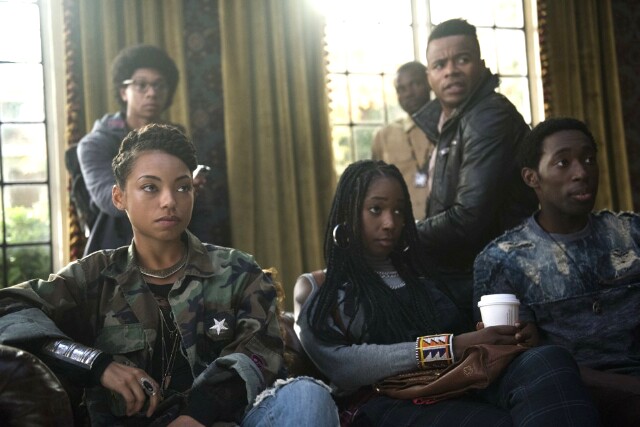“Dear White People”: As Woke As It Gets

If you look up “woke” in the dictionary, I’m pretty sure there’s a picture of Justin Simien sitting there. In 2014, Justin gave us Dear White Peoplethe movie, a refreshingly honest social satire that explored racial identity on a fictional campus in a very real depiction of an America that’s not as post-racial as it likes to think. Now, Simien has given us Dear White Peoplethe series on Netflix. Where the movie made the (probably time-based) decision to mainly follow four specific students on campus, the series widens its scope to include more of the supporting characters -- a move that is, in itself, as woke as it gets.
I found the decision to turn the clock back to the movie’s climactic and eye-opening, divisive “Black Face Party” -- a very racist party thrown by white students that parallels the very real events of a frat party thrown at Arizona State University in 2014 -- to be an interesting one. It goes on to tell a modified version of the original story that focuses on the original main characters and opens up to include their friends and fellow classmates. Fans of the movie will see re-imagined versions of familiar events but, unsurprisingly, the narrative gets better when the metaphorical town hall hears more than four voices -- and even better than that when we get to see how the campus reacts to the reverberations of that party beyond the movie’s original ending. For newcomers, there’s enough exposition (cleverly worked in by series narrator Giancarlo Esposito) to bring them up to speed on the who, what, where, when, why and WTF of it all.
The characters are still essentially the same but with minor differences. Samantha White (played by Logan Browning) is still the campus revolutionary although she’s decidedly less abrasive, but in a way that doesn’t castrate her convictions so much as just make her a little friendlier. (See: Her movie interactions with Lionel versus those in the series.) Colandrea (a.k.a. “Coco,” played by Antoinette Robertson) is still more or less avoiding her blackness, though her motivations are different. In the movie, she was intent on achieving literally any form of fame/success while putting down black culture as much as possible because of her personal perception of blackness and ratchetness being synonymous. In the series, she’s super-intelligent and motivated by actual work ethic-based success, with her disdain for her own culture being based on her constant position in life as the only black girl in the room.
As for Lionel Higgins (DeRon Horton), his life gets fleshed out as well, focusing a little less on the social awkwardness of the no man’s land that is being black and gay and introverted, and focusing more on his unrequited attraction to the dean’s son Troy Fairbanks (still played by Brandon P. Bell). Lionel’s role as a reporter for the campus newspaper holds a bit more weight as well, acting not just as a plot device that places him at the center of main events, but also a way for his editor Silvio (D.J. Blickenstaff) to keep it funky (honest) andkeep it funny with him through their shared dialogue.
Samantha’s core group of friends has gotten a larger platform, as well. They are a diverse group of students that represent different aspects of black culture -- light-skinned, dark-skinned, male, female, gay, straight and one dude who’s actually from Africa. All of them have voices and opinions of their own and while their banter is as hilarious as it is socially aware, it’s their emotional reactions that ring the bell of truth.
I have to single out Marque Richardson who plays Reggie Green. In the movie his character was a tad more one-note in that he was aggressively focused on the campus’s pro-black movement and his personal attraction to Sam. In the series, Reggie still has the same motivations, but has a greater range of emotionality that Richardson handles with ease. A lot of the main players in this cast have some pretty intense and thought-provoking moments (many of which are punctuated by a fourth wall-breaking stare into the camera), but Reggie’s character in particular resonated with me on a personal level. Sure, we’re both good-looking, educated black men, but it’s specifically his confidence when vocalizing and defending his point of view that I envy, mostly because before having this platform my opinions were often lost in the sauce or altogether withheld due to fear of social backlash or judgment from those closest to me. I guess in a way that makes Lionel a kindred spirit, as well.
And that is the genius of Simien’s work: Its ability to humanize everyone through an actual discussion about the social construct of race that does not villainize anyone until they villainize themselves. It helps feed a growing subculture of independent thinkers who are in fact actually post-racial and waiting for the rest of the world to catch up. It allows me, and others like me (regardless of race), to easily relate to these fictional characters and the very real issues that they face, because we face them, too.
Above (almost) all else, Dear White Peopleis hilarious. Yes, it comments on everything from social media, police interactions and cultural appropriation to relationship dynamics and race relations, but it’s also funny as hell. The comedic wit and everyone’s apparent inclination to “clap-back” turns something that could’ve very easily been misconstrued as heavy-handed and opinionated into what feels like The Social Networkmeets a less over-the-top Next Friday. The world needs more of this ... a lot more.
Stay woke.
Click the social buttons above or below to share this content with your friends and colleagues.
The opinions and points of view expressed in this content are exclusively the views of the author and/or subject(s) and do not necessarily represent the views of MediaVillage.com/MyersBizNet, Inc. management or associated writers.


